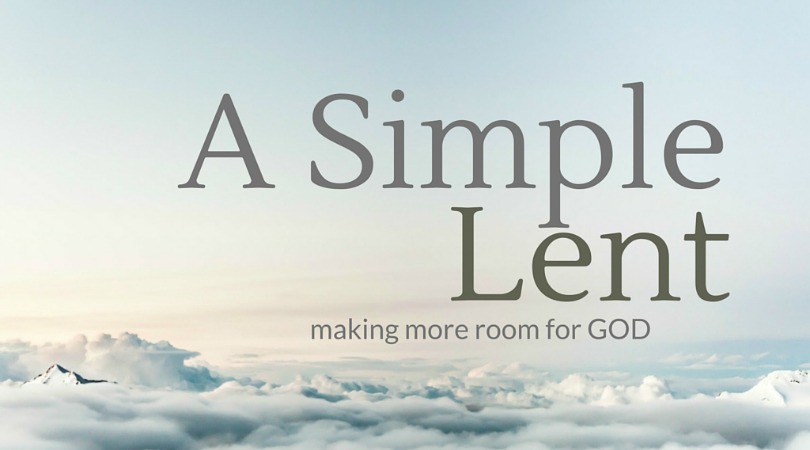They Did Not Understand About the Loaves
(Day 21 of A Simple Lent)
Friday
This is one of the most pointed moments in the gospel of Mark:
Jesus has provided for the multitudes at a time when the disciples were exhausted and needed a break and Jesus wanted to give it to them, but he looked and saw these leaderless people and he had to. He had to be with them.
He said they looked like sheep without a shepherd, but I’m thinking they looked as sad and pathetic as a dog who just wants you to give him a little love. Just a little. We’re not asking for much, here.
Jesus has the disciples find some food and somehow it is enough. Not just a minimal enough, enough that all could eat and be filled.
Then Jesus sends them out ahead while he gets some “me” time. But then he sees them going against the wind, having such a horrible go of it. So Jesus comes to them. He doesn’t have a boat, so he’ll just walk out to them. Help them. They look so pathetic, don’t they?
The disciples see Jesus and they’re thinking he’s a ghost, so they freak out at the sight of him, but Jesus identifies himself and tells them to not be afraid.
And the scene ends cryptically:
Then he got into the boat with them and the wind ceased. And they were utterly astounded, for they did not understand about the loaves, but their hearts were hardened.
What are we to make of this weird story?
Lots More To It Than Walking On Water
This story has so many elements, perhaps the least interesting to me is that Jesus walks on water.
- There is the connection between the crowds and the disciples
- And between the feeding and the being in the boat
- And between the fear of Jesus as a ghost and the fear they earlier expressed at Jesus stilling the storm
- And between the hardship of life and the wind against the disciples
- There is the confusion of the disciples
- And the hardness of their hearts.
Lots to go on.
But the place I start is to see that the writer of the gospel sees these connections and sees this story as connected with yesterday’s. We know this because of the line about their not understanding about the bread.
Understanding Enough
What’s consistent in the gospel of Mark is this sense of understanding: of knowing that Jesus is more than the man in front of them; more than a prophet and a healer. He can command the wind. He can drive out a legion of demons. And apparently he can also walk on water, too.
And Jesus wants them to see this. He wants them to not only hear it and get it with their brains, he wants them to understand who he is and what he is trying to teach them.
And he just taught them about sufficiency and all having enough. Now they are the ones straining and struggling and confused and Jesus is coming to them to show them again what enough looks like.
Misunderstanding
We shouldn’t fault the disciples for not understanding about the loaves. We don’t either. Yesterday I talked about how we know the story so well, but often mistake the purpose; mistaking sufficiency for abundance; mistaking generosity for blessing; mistaking compassion for an expected gift.
It seems that while we’re all distracted by the magic hands waving about and suddenly there’s enough food to feed everybody, the real lesson was in the demonstration. The disciples were supposed to observe the whole thing. Observe his compassion. His teaching. His inviting them to participate in the miraculous feeding, His expectation, not for self-sufficiency, but for all-sufficiency. That maybe they were to take those 12 baskets and do what he did.
- Feel empathy and show compassion.
- Teach the lost.
- Feed so all are fed.
- Hand over baskets of food so new people can do the same.
The disciples didn’t understand because their hearts were hard. They were thinking of other things.
The Wind Against the Boat
How hard our hearts? What is the wind that pushes up against our boat so that we struggle to make it to the other side? Where is our faith? Where is our watching our rabbi and following his teachings?
Where is our sufficiency and our faith to feed everyone?
How are we the ones who “don’t understand about the loaves”?
I do this when I strategize and over analyze. Or when I take Paul’s imploring too literally, trying to be all things to all people. Or when I’m trying to sweet-talk Pharaoh into giving my people the prime grazing land.
I do this every time I say “I can’t.”
Very different from I won’t. Or even I don’t want to. This is not only an excuse, but an opportunity to create a reality in which that is actually true. Creating a new reality in which we actually can’t.
As a Christian, the phrase “I can’t” shouldn’t ever be used. It isn’t a realistic assessment of where we are. It is a denial of where we could be and what GOD is capable of doing through us.
Saying “I can’t” is misunderstanding the loaves. And our work is about giving away bread.
Daily Office Readings
Or visit the alternative Daily Office I often use.
Homework
This week’s homework is to surround yourself with what brings joy to your life.
Download the worksheet: A Simple Lent-Handout 3!


Leave a Reply